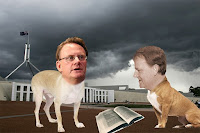 Can any parallels be drawn between the Australian elections of 2007, (the Kevin’07 campaign) and the current U.S. presidential elections? There are some similarities and some obvious differences. For a start, America is a super power and its political trends have far reaching global implications while Australia is by comparison an inconsequential backwater (the arse end of the earth to use the phrase coined by ex prime minister Paul Keating). Australia’s political system is fundamentally different to the American system and is based on the British Westminster system. Despite the fact that in Australia and Britain votes are cast for one party or another rather than the leader as head of state, both have moved closer to presidential style campaigns in recent years. The personality of leaders is ever more important and campaigns are carefully planned in response to polls and demographic analysis.
Can any parallels be drawn between the Australian elections of 2007, (the Kevin’07 campaign) and the current U.S. presidential elections? There are some similarities and some obvious differences. For a start, America is a super power and its political trends have far reaching global implications while Australia is by comparison an inconsequential backwater (the arse end of the earth to use the phrase coined by ex prime minister Paul Keating). Australia’s political system is fundamentally different to the American system and is based on the British Westminster system. Despite the fact that in Australia and Britain votes are cast for one party or another rather than the leader as head of state, both have moved closer to presidential style campaigns in recent years. The personality of leaders is ever more important and campaigns are carefully planned in response to polls and demographic analysis.
In both the 2007 Australian election and the 2008 American election, long serving conservative governments faced off against an opposition claiming to represent the winds of change. Despite McCain’s efforts to distance himself from the Bush administration and present himself as a ‘maverick’, years of alignment with Bush’s policies will make any distancing difficult. Howard described himself as a ‘climate change skeptic’ and refused to sign the Kyoto protocol. McCain is also seen as weak on the environment.
Both Howard and McCain are older men and both struggle to represent themselves as men of the future. Both Rudd and Obama are younger men and have found it much easier to present themselves as a breath of fresh air, despite lacking any truly revolutionary policies.
Perhaps the greatest similarity between the Australian campaign and the U.S. campaign is the advent of the internet as a potent political force. Howard was slow to employ the web to his advantage and his use of it showed a fundamental misunderstanding of the medium. Howard’s YouTube videos were stiff and conventional, much a like a party political broadcast on tried and true TV. Howard’s YouTube received numerous negative comments and users were outraged when their comments were promptly deleted. It also quickly became a spam magnet. Rudd primarily used MySpace and his tone was much more casual and relaxed. The majority of comments were positive but negative comments remained on the site. Rudd’s savvy use of the web medium made it easier for him to be portrayed as future friendly and helped his campaign resonate with younger voters.
John McCain claims not to know how to even use email and has all but admitted he is technology illiterate. Obama’s campaign seems to be using the web much more effectively. The reasons for this are quite simple; the Obama camp spends way much more on advertising. Obama’s web site is much more popular McCain’s site; it is visited monthly by 4 times as many people as McCain’s one (2.2 million vs. 583 thousand). Obama is also much more popular with various social media sites as well.
Sarah Palin's use of her personal email account to conduct public affairs in Alasksa, which allowed a hacker to gain access to her account does little to negate the perception that the Republican camp is technologically challenged. McCain may have chosen Palin as running mate partly because of her youth. Despite getting a temporary boost after the convention, Palin's inexperience now seems to be doing little more than making McCain look old.
Effective use of online media may not be the deciding factor in this campaign, nor was it in the Australian election, however, it is undeniable that the political importance of the web is now much greater. This is also a particularly telling factor when candidates attempt to promote themselves as agents for change and leaders for the future.
McCain is looking more and more like yesterday's man, as did John Howard.




 iWalk
iWalk







